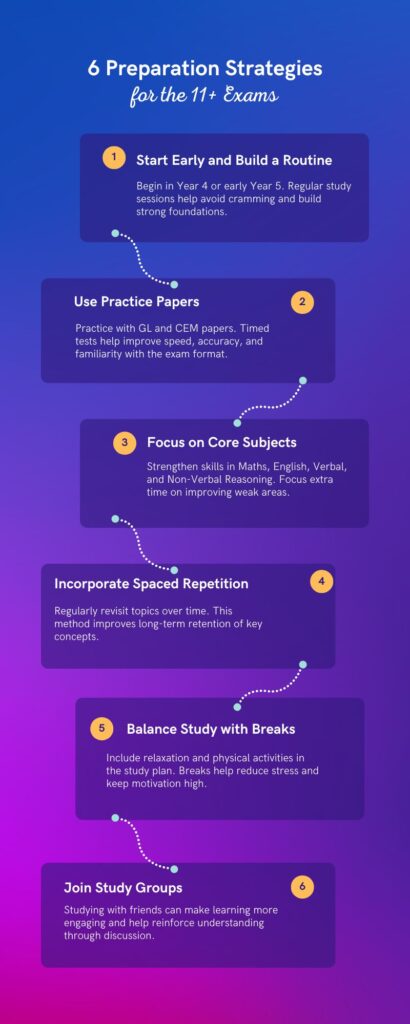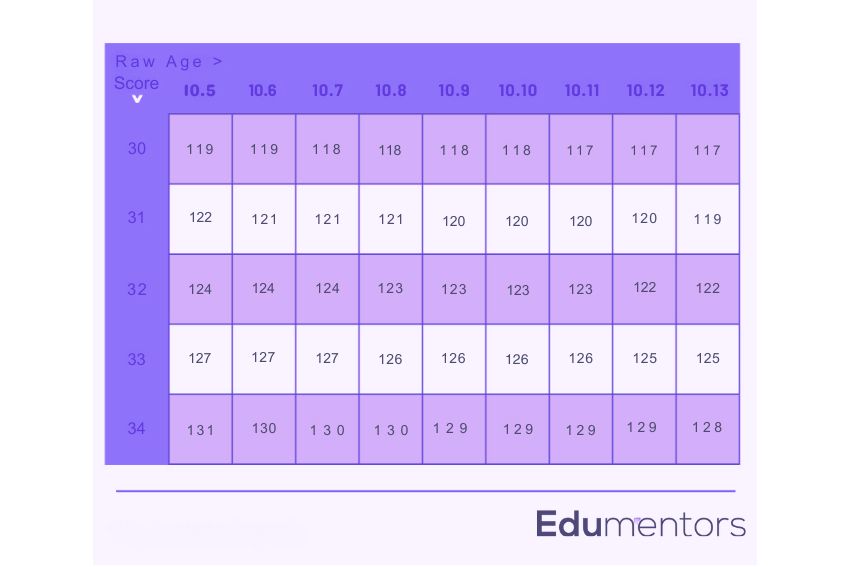A Parent Guide to 11+ Exams – Top Tips and Success Strategies
The 11+ exams are a key milestone for children aspiring to attend grammar schools or selective independent schools in the UK. As a parent, it’s important to understand how these exams work and how best to support your child through the process.
This guide offers clear and practical advice on the 11+ exams, including what they involve, how to prepare effectively, and strategies to help your child succeed. Whether you’re new to the 11+ journey or looking to improve your child’s study routine, this guide provides the essential knowledge and tools you need to navigate the process with confidence.
What Are the 11+ Exams?
The 11+ exams are selective tests used by grammar and some independent schools in the UK to admit students. Therefore, Taken by children in Year 6, the exams assess skills in Maths, English, Verbal Reasoning, and Non-Verbal Reasoning.
The exams are named “11+” because students are around 11 years old when they take them. The format varies by region and exam board, with GL Assessment and CEM being the most common providers.
Passing the 11+ is required for admission to grammar schools, but it doesn’t guarantee a place due to competition and other factors like catchment areas. Not all students take the 11+, as it’s not compulsory for comprehensive schools.
In summary, the 11+ exams test academic ability and are a key step for those seeking entry into selective schools.

Preparation Strategies for the 11+ Exams
Preparing for the 11+ exams requires a well-thought-out plan. Success comes from a combination of early preparation, focused practice, and managing both study and well-being. In this section, we’ll outline key strategies that will help your child build confidence and perform their best on exam day.
These tips will guide you through creating a structured approach that balances academic work with maintaining your child’s motivation and health.
1. Start Early and Build a Routine
- Explanation: Begin preparation in Year 4 or early Year 5 to give your child ample time to cover all topics. Create a consistent study routine with regular sessions each week. This gradual approach prevents last-minute cramming and helps solidify knowledge over time.
2. Use Practice Papers
- Explanation: Familiarise your child with the exam format by using practice papers from both GL and CEM exam boards. Timed practice tests help improve speed and accuracy, and reveal areas that need more focus. The more they practise, the more comfortable they’ll be on exam day.
3. Focus on Core Subjects and Weak Areas
- Explanation: Ensure your child has a strong grasp of Maths, English, Verbal, and Non-Verbal Reasoning. Identify weak areas early and dedicate extra time to improving them. This targeted practice can significantly boost overall performance.
4. Incorporate Spaced Repetition
- Explanation: Spaced repetition involves revisiting topics at intervals over time, which helps move information into long-term memory. This method is particularly effective for retaining vocabulary, mathematical concepts, and reasoning techniques.
5. Balance Study with Well-being
- Explanation: Avoid overloading your child with too much work. Instead, include breaks, physical activities, and relaxation time in the study schedule. This way, a balanced approach keeps them motivated and also reduces stress, which is essential for peak performance. Ultimately, these strategies help maintain both their well-being and academic progress.
By implementing these strategies, you can ensure your child is prepared, confident, and ready to succeed in the 11+ exams.

The Eleven Plus Exam Format
The 11+ exam format can vary depending on the region and the exam board, but it typically includes four main subjects: Maths, English, Verbal Reasoning, and Non-Verbal Reasoning. These subjects are designed to test a child’s academic ability and logical thinking.
- Maths: This section covers arithmetic, problem-solving, and mathematical reasoning. It may include questions on topics like fractions, algebra, and geometry.
- English: This part tests grammar, vocabulary, reading comprehension, and sometimes creative writing. It assesses a child’s understanding of language and ability to express themselves clearly.
- Verbal Reasoning: This section focuses on language-based logic, such as identifying word patterns, solving word puzzles, and understanding relationships between words.
- Non-Verbal Reasoning: This tests a child’s ability to work with abstract concepts using shapes and patterns, focusing on skills like spatial awareness and logical problem-solving.
The exam can be either multiple-choice or standard written format, depending on the exam board. GL Assessment and CEM (Centre for Evaluation and Monitoring) are the two main exam boards, each with slightly different formats and question types.
The duration and structure of the exam can also vary. Typically, each subject has a set time limit, and students must complete all sections within the given time. Therefore, it’s essential for students to practice managing their time effectively so that they can answer all questions. In addition, time management practice helps build confidence and reduces the risk of running out of time during the actual exam.
Understanding the format is crucial for effective preparation, as it helps tailor study plans to the specific requirements of the exam.
Frequently Asked Questions by Parents
Now we will talk about most frequently asked question by parents and try to satisfy all your questions. After the research we find pain points which you struggle to answer. Therefore, in this part of blog you will find every answer to possible questions which you will need in 11 plus.
How do I Apply for the 11+ Exam?
To apply for the 11+ exam, you typically need to start by registering your child through the local authority or the specific grammar school to which you are applying. Firstly, the registration process usually involves filling out an online form, which may be called a Supplementary Information Form (SIF) in some areas. Additionally, the exact process and deadlines can vary depending on your region and the school. Therefore, it’s crucial to check the specific requirements early to ensure you meet all the necessary criteria.
Here’s a general guide
- Check Local Authority or School Website: Start by visiting the website of your local authority or the grammar school to find out the registration details and deadlines.
- Complete the Application Form: Most applications are done online, where you provide your child’s details and select the schools you’re applying to.
- Submit the Form by the Deadline: Ensure you submit the form before the deadline, which is typically in the summer before your child starts Year 6.After registering for the exam, you will also need to apply for secondary school places separately, usually through the local authority’s school admissions process.
How is the 11+ Exam Scored, and What is a Good Score?
The 11+ exam is scored using a standardised score, which adjusts your child’s raw score (the number of correct answers) based on their age and the difficulty of the test. This ensures that younger children are not disadvantaged compared to older ones.
How It’s Scored:

- Raw Score: The initial score based on the number of correct answers.
- Standardisation: Adjusts the raw score to account for the candidate’s age and the overall difficulty of the exam.
- Final Standardised Score: This is the score that is used by schools to rank students for admission.
What Is a Good Score?
A “good” score varies depending on the school or consortium. Typically, a standardised score of 110 or above is considered competitive for most grammar schools. However, in some areas, you may need a score of 121 or higher to secure a place, especially in highly competitive regions like Buckinghamshire.
Can my Child Still Attend a Good School if They Don’t Pass the 11+?
Yes, your child can still attend a good school even if they don’t pass the 11+ exam. There are many excellent comprehensive schools, faith schools, and academies that do not require the 11+ for admission. Additionally, these schools offer a broad curriculum and can provide a high-quality education. Moreover, they often come with strong support systems and a wide range of extracurricular activities. As a result, they can be a great alternative for families seeking diverse educational opportunities.
Additionally, if your child doesn’t pass the 11+, some schools offer appeal processes where you can challenge the decision, though success rates can vary. It’s also worth considering other selective schools or independent schools that may have different admission criteria.
Ultimately, passing the 11+ is just one path to a good education, and many children thrive and succeed in schools that don’t require the exam.
When Should I Start Preparing my Child for the 11+?
It’s generally recommended to start preparing your child for the 11+ exam at the end of Year 4 or the beginning of Year 5. This allows ample time to cover all necessary subjects and build familiarity with the exam format without overwhelming your child.
Starting early also enables a steady, consistent approach to learning, which is more effective than last-minute cramming. By spreading the preparation over time, you can incorporate regular practice, identify areas of weakness, and improve them gradually. This also helps reduce stress and ensures that your child feels confident and well-prepared when exam day arrives
Can my Child Retake the 11+ exam?
No, your child cannot retake the 11+ exam for the same school or consortium. The 11+ exam is typically a one-time test, and students are only allowed to take it once during the application process. This rule applies across most regions and exam boards.
If your child doesn’t pass or doesn’t achieve the desired result, they won’t have the opportunity to sit the exam again for that specific school or entry year. However, you can explore other schools or educational pathways, such as comprehensive or independent schools that may have different admission processes.
How do I Help my Child Manage Stress and Time During the 11+ Exams?
As we all know from our own experience exams are stressful. Children will need our help to reduce stress level and feel more confident about what they are doing. There are lots of ways to reduce stress and everyone may have their own ways to do so.
We find best tips to reduce stress recommended by doctors and psychologists. To make your job at your maximum you will need all your strength. Therefore, this tips will help you to minimize anxiety and build confidence which will help your child to get better results.
Here are Top Tips
1. Get Enough Sleep
- Helps Mood Regulation
- Improved Cognitive Function
- Physical Relaxation
- Establishing a Routine
2. Eat Well
- Focus on Whole Foods
- Include Omega-3 Fatty Acids
- Prioritise Magnesium-Rich Foods
- Maintain Stable Blood Sugar Levels
3. Help them study
- Provide a Quiet Study Space
- Break Down Tasks
- Encourage Regular Breaks
- Teach Time Management
- Offer Support Without Taking Over
4. Talk about exam nerves
- Acknowledge the Nerves
- Preparation is Key
- Visualisation Techniques
- Positive Self-Talk
- Breathing Exercises
- Practice Mindfulness
- Create a Relaxing Pre-Exam Routine
5. Study With Your Friends
- Shared Learning
- Emotional Support
- Motivation Boost
- Breaks and Relaxation

How do I Know if my Child is on Track to Pass the 11+?
There is certain ways to see if your child doing good on his path for 11+. Here is couple tips how you can test progress.
Regular Assessment: Use practice papers and mock exams to assess your child’s performance. Timed practice under exam conditions can give you a good indication of how well they are likely to do on the actual test. Look for consistent improvement over time, particularly in areas where they initially struggled
Benchmark Scores: Compare your child’s scores on practice tests to the expected pass marks or standardised scores required by the schools you’re targeting. Aiming for a standardised score of around 110 or higher is typically a good benchmark for most grammar schools, though this can vary by region
Feedback from Tutors: If your child is working with a tutor, ask for regular feedback on their progress. Tutors can provide valuable insights into whether your child is on track and identify any specific areas that may need more focus
Progress in Core Subjects: Ensure your child has a solid understanding of the core subjects tested in the 11+—Maths, English, Verbal Reasoning, and Non-Verbal Reasoning. Moreover, Consistent performance across these subjects is a strong indicator that they are on track.
Managing Exam Day

Managing exam day is crucial for ensuring your child stays calm and focused during the 11+ exams. A well-prepared child is more likely to perform their best, and as a parent, you can play a significant role in making the day run smoothly.
From ensuring everything is ready the night before to helping your child manage their time and stress during the exam, small actions can make a big difference. In this section, we’ll explore simple, effective strategies that will help both you and your child feel confident and organised on the big day.
- Prepare the Night Before: Ensure everything is ready—pens, erasers, and any required documents. This avoids any last-minute panic.
- Healthy Breakfast: Start the day with a balanced breakfast. This will help your child stay focused and maintain steady energy levels throughout the exam.
- Arrive Early: Get to the exam location with plenty of time to spare. Arriving early allows your child to settle in and reduces any stress from rushing.
- Stay Calm: Encourage your child to use deep breathing techniques if they feel anxious. Remind them to focus on the present task, not the outcome.
- Time Management: Advise your child to answer the easy questions first and then return to the harder ones. This keeps their confidence up and ensures they don’t spend too much time on one problem.
- Stay Positive Afterward: After the exam, focus on your child’s effort, not just the result. This helps them feel supported, no matter how they think they did.
By following these simple steps, you can help your child navigate exam day with confidence and reduce unnecessary stress.
Preparing for the Exam With a Tutor
Working with a tutor can significantly enhance your child’s preparation for the 11+ exams. Tutors provide personalised guidance, focus on specific areas of improvement, and offer structured learning that aligns with the exam format. Whether your child struggles with particular subjects or needs extra practice with reasoning skills, a tutor can tailor their approach to meet your child’s unique needs.
Why Consider a Tutor?
- Personalised Attention: Tutors can identify your child’s strengths and weaknesses and create a targeted study plan. This ensures that your child focuses on the areas that need the most improvement.
- Expert Knowledge: Tutors are often well-versed in the specific requirements of the 11+ exams, including the differences between GL Assessment and CEM formats. This expertise allows them to provide focused practice and valuable exam techniques.
- Consistent Practice: Regular sessions with a tutor ensure that your child remains consistent in their preparation, reducing the likelihood of last-minute cramming.
Why Choose Edumentors? At Edumentors, we connect you with 11+ tutors who have experience from top UK universities, ensuring that your child receives high-quality guidance. Our tutors are not only knowledgeable in their subjects but also understand the demands of the 11+ exams.
Working with a tutor from Edumentors can give your child the confidence and skills they need to perform their best on exam day, providing you with peace of mind knowing they are well-prepared.
Conclusion
Preparing for the 11+ exams is a significant step in your child’s educational journey. With the right strategies, they can confidently approach the exams. By starting early, using practice papers, and focusing on core subjects, while also balancing study with well-being, you can ensure your child is well-prepared for success. Ultimately, these efforts will help them perform at their best on exam day.
Additionally, understanding the exam format, managing stress, and staying organised on exam day are key components to success. Remember, while the 11+ is important, it’s just one path, and many excellent educational opportunities exist beyond it. For more information about check out 11 Plus Exams: Everything you Need to Know.
Make sure your child have good assistance by choosing Edumentors!








